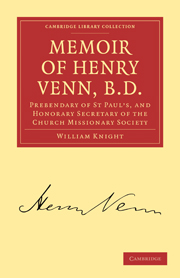 Memoir of Henry Venn, B. D.
Memoir of Henry Venn, B. D. Book contents
- Frontmatter
- PREFACE
- PREFACE TO THE FIRST EDITION
- Contents
- CHAPTER I EARLY YEARS AND LIFE AT CAMBRIDGE, 1796-1827
- CHAPTER II MINISTERIAL AND DOMESTIC. 1827-1839. DRYPOOL AND HIGHBURY
- CHAPTER III LETTERS. 1835-1846. DEATHS OF MISS A. SYKES AND MRS. VENN. RESIGNATION OF ST. JOHN'S, HOLLOWAY
- CHAPTER IV THE CHURCH MISSIONARY SOCIETY
- CHAPTER V PRIVATE JOURNAL, 1849-1856
- CHAPTER VI PERSONAL TRAITS
- CHAPTER VII LETTERS, 1846-1872
- CHAPTER VIII THE CLOSE
- APPENDIX
- A FOUNDERS OF C. M. SOCIETY, AND FIRST FIVE YEARS (1799—1804)
- B RETROSPECTIVE ADDRESS, MARCH 7, 1862
- C MINUTES ON THE ORGANISATION OF NATIVE CHURCHES
- D EPISCOPACY IN INDIA AND MADAGASCAR
- E POLITICS AND MISSIONS
- F MISSIONS IN THEIR VARIETY
- G SOME EMINENT MISSIONARIES
- H INDEPENDENT ACTION OF C. M. SOCIETY
- I THE PROPER INTERPRETATION OF THE BAPTISMAL SERVICE
- J COMMISSION ON CLERICAL SUBSCRIPTION
- K RITUAL COMMISSION
C - MINUTES ON THE ORGANISATION OF NATIVE CHURCHES
Published online by Cambridge University Press: 05 October 2010
- Frontmatter
- PREFACE
- PREFACE TO THE FIRST EDITION
- Contents
- CHAPTER I EARLY YEARS AND LIFE AT CAMBRIDGE, 1796-1827
- CHAPTER II MINISTERIAL AND DOMESTIC. 1827-1839. DRYPOOL AND HIGHBURY
- CHAPTER III LETTERS. 1835-1846. DEATHS OF MISS A. SYKES AND MRS. VENN. RESIGNATION OF ST. JOHN'S, HOLLOWAY
- CHAPTER IV THE CHURCH MISSIONARY SOCIETY
- CHAPTER V PRIVATE JOURNAL, 1849-1856
- CHAPTER VI PERSONAL TRAITS
- CHAPTER VII LETTERS, 1846-1872
- CHAPTER VIII THE CLOSE
- APPENDIX
- A FOUNDERS OF C. M. SOCIETY, AND FIRST FIVE YEARS (1799—1804)
- B RETROSPECTIVE ADDRESS, MARCH 7, 1862
- C MINUTES ON THE ORGANISATION OF NATIVE CHURCHES
- D EPISCOPACY IN INDIA AND MADAGASCAR
- E POLITICS AND MISSIONS
- F MISSIONS IN THEIR VARIETY
- G SOME EMINENT MISSIONARIES
- H INDEPENDENT ACTION OF C. M. SOCIETY
- I THE PROPER INTERPRETATION OF THE BAPTISMAL SERVICE
- J COMMISSION ON CLERICAL SUBSCRIPTION
- K RITUAL COMMISSION
Summary
FIRST PAPER, ISSUED 1851
Minute upon the Employment and Ordination of Native Teachers
General Principles
The advanced state of missions having rendered it desirable to record the views of the Society upon the employment and ordination of native teachers, the following particulars are given for the information of its missionaries:
1. In all questions relating to the settlement of a native Church in any mission field, it is important to keep in view the distinction between the office of a Missionary, who preaches to the heathen, and instructs inquirers or recent converts, and the office of a Pastor, who ministers in holy things to a congregation of native Christians.
2. Whilst the work of a missionary may involve for a time the pastoral care of newly-baptized converts, it is important that, as soon as settled congregations are formed, such pastoral care should be devolved upon native teachers, under the missionary's superintendence.
3. The native teacher, who approves himself ‘apt to teach’ is appointed to the office of a Catechist. The office of a catechist has been always recognised in the Church of Christ for evangelistic work, his function being to preach to the heathen, and to minister in congregations of converts until they are provided with a native pastor.
4. As a general rule, a catechist should be presented to the Bishop for ordination only with a view to his becoming pastor of some specified native congregation or district.
- Type
- Chapter
- Information
- Memoir of Henry Venn, B. D.Prebendary of St Paul's, and Honorary Secretary of the Church Missionary Society, pp. 412 - 438Publisher: Cambridge University PressPrint publication year: 2010First published in: 1880


